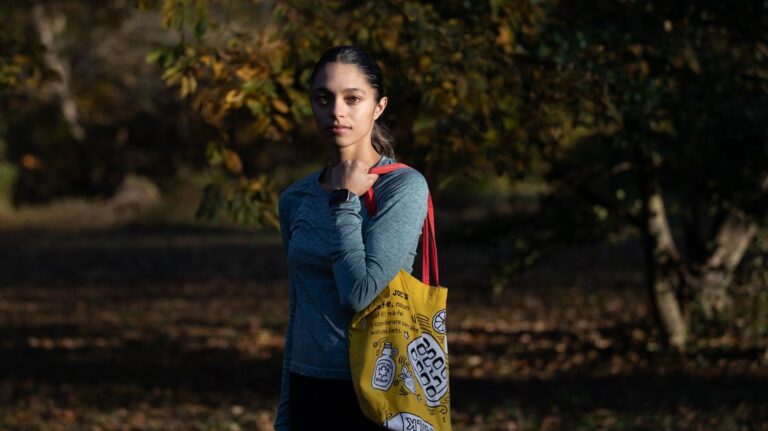Summer Kerksick used to think her government job was a stable, sustainable career.
“Which is ironic right now,” she said.
For the past four years, the 24-year-old Silver Springs, Maryland, resident worked as a market research analyst for the Department of Commerce. She enjoyed helping rural businesses export products and learning about the cool products they make.
“My uncle is a government employee, and I just saw how much pride that he took in his job. And I was like, ‘I want a job that’s like that,’” Kerksick said.
But since the October government shutdown, Kerksick has been furloughed, which means she’s one of the estimated 750,000 federal workers across the United States who are on an indefinite unpaid leave of absence.
“At first I thought this was just going to be a week,” Kerksick said, so she took a week of paid time off.
But the government shutdown ― which is now the longest in U.S. history ― has dragged on longer for more than one month with no end in sight. And Kerksick is facing harder financial choices.
Kerksick declined to share her salary but said it’s “not enough.” As a contractor, she doesn’t “get paid a whole lot of money, because that’s the point of being a public servant.“

Charlotte Kesl for HuffPost
Kerksick lives by herself. Her rent is $1,535 a month, and one of her monthly paychecks goes straight to housing and the other check covers groceries, train tickets to work, medications, doctor’s appointments, and her $230 car insurance.
“So to miss the one paycheck for discretionary spending, OK, that’s fine, but to miss the second paycheck that covers the big bills, this is starting to become a bit problematic,” she said. Her emergency savings “could cover maybe two months” of rent.
“Most Americans live paycheck to paycheck, so when you’re now at paycheck number two, possibly number three, things get very serious, very quickly,” she said.
How A Food Bank Is Helping Her Stretch Meals
Kerksick is doing everything she can to avoid dipping into her emergency savings. She asked her landlord for flexibility on paying rent, but never heard back. She has applied to get unemployment benefits and for a local Mobilize Montgomery initiative to help federal workers find jobs.
One budgeting action in her control is to keep weekly groceries under $55. In October, Kerksick lined up for her first food bank, a Capital Food Bank program specifically for federal contractors and employees in the Washington, D.C., area to get shelf-stable pantry items and fresh produce.

Charlotte Kesl for HuffPost
“You see people volunteering at those all the time, and you don’t think about it until you’re in one yourself,” Kerksick said. “The last [shutdown] was when I was in high school, and that didn’t personally affect me at the time, but now it’s greatly affected me.”
She has now gone twice, and it helped her extend meals, so that she could be on “night three of quesadilla and rice and beans from the food pantry.”
She waited more than two hours her first time and got spaghetti sauce, black beans, pinto beans, brown rice, quick oats, and prepackaged chicken. Her first time going she didn’t realize you needed to bring your own bag, the next time she was ready and scored fresh collard greens and tomatoes.
“I didn’t feel any shame going there. I was just in shock about how many people were in line,” Kerksick said. “That just speaks to how grave this is getting.”
‘At The End Of The Day, We’re People That Are Missing Our Paychecks.’
Kerksick did get good news at the end of October when she got her most recent two paychecks processed –– “a huge relief” to help pay for November rent, she said. “However, from now until the shutdown ends I will not be getting paid since I’m not using PTO…It still makes me anxious that I won’t be getting another check for a while.”

Charlotte Kesl for HuffPost
Being a furloughed employee is a unique kind of limbo, because it’s not a vacation. Kerksick feels like she is “being held on a leash right now” because she is technically still employed and can be recalled back to work any day, which limits her travel. During her days, she trains for a 5K race, crochets stuffed animals and watches true crime documentaries to destress.
Kerksick said the biggest misconception she thinks people have about the shutdown is around the impact it’s having on workers like herself: “We do have savings, but that can only take you so far.”
She wants everyone to reflect on how hard it would be for you and your family to miss two paychecks in a row. “It’s easy to point out, ‘Oh, so you don’t have a savings or you can’t go without this?’ But it’s hard,” she said.
“You’re from the outside looking in. And if you were to put yourselves in our shoes, what would you do?” Kerksick continued. “You might look at the people in the food bank line and think, ‘Oh, they’re just accepting a handout when you don’t know our situations at all.’”
“At least have some empathy for us as just human beings that are trying to get by, despite politics or whatever you believe about the government and how useful we all are,” Kerksick said. “At the end of the day, we’re people that are missing our paychecks.”
Cost of Living is a new series that reveals true stories of how people make money, lose money and deal with all the pressures of our current economic climate. Have a candid story about how you switched careers, spent a windfall, combined finances with a partner or survived a mass layoff? Or maybe you’ve been personally impacted by the current administration’s changes? We want to hear it all. Email [email protected].


